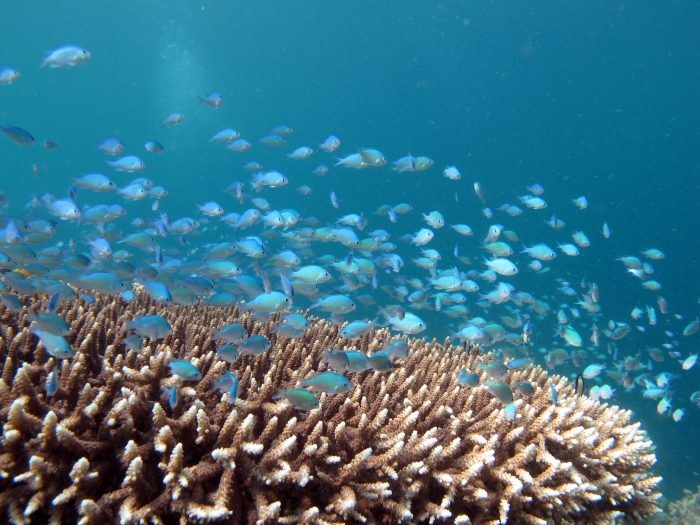From the ARC Centre of Excellence for Coral Reef Studies:
Shoal-mates soothe stressed fish
Coral reef fish get stressed and lose weight if they are separated from each other, according to new research about the Great Barrier Reef.
For the first time, researchers from the ARC Centre of Excellence for Coral Reef Studies at James Cook University have succeeded in measuring the metabolic rates of individual fish in shoals to better understand why they prefer to socialise.
“We have suspected that shoaling fish gain a “calming effect” from living in a group. But up until now we have been unable to measure how widely spread this effect is in individual fish,” says lead author Lauren Nadler.
Her team captured shoals of the blue-green damselfish, Chromis viridis, near Lizard Island on the Great Barrier Reef. The fish were then either isolated or kept together in shoals.
“The fish that were isolated lost weight after the first week, which meant they were less healthy than those in groups,” Nadler says.
The metabolic rate (an indicator of stress) of all fish was then measured both in a shoal and alone.
“Fish were calmer and less stressed when they had their shoal-mates around, with a 26% decrease in metabolic rate compared to individuals tested alone.”
“If these fish were out in the ocean by themselves, in order to stay alive they would need more food to keep up their energy. Since they don’t have their buddies around to help look out for looming predators, foraging for food would be riskier,” says Professor Mark McCormick.
“The extra energy fish gain from shoaling is so important because it allows them to survive and reproduce and to pass on their genes to the next generation of fish,” he says.
One way fish can become separated from each other is through natural disturbances like tropical cyclones.
“When category 4 Cyclone Nathan passed over Lizard Island last year, we saw a number of blue-green damselfish living by themselves on small coral colonies. They were apparently separated from their group by the sheer force of the storm and currents. Our results show how important group living is for healthy fish populations,” Nadler says.
The paper Shoaling reduces metabolic rate in gregarious coral reef fish species has been published in the Journal of Experimental Biology.











0 Comments